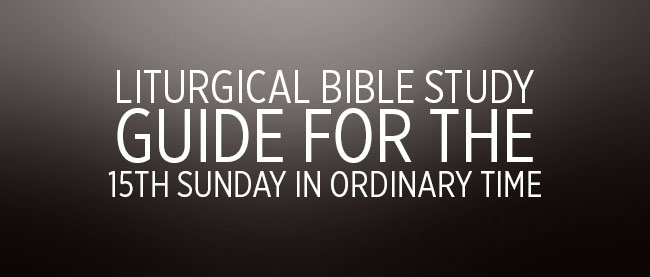1st Reading – Amos 7:12-15
Amos is the oldest of the books of prophetic literature, dating around the time 760 to 750 B.C. He appears to have been a layman with no special training for the religious ministry. Amos wrote during the reign of Jeroboam II of the Northern Kingdom (Israel). It was a time of peace and prosperity but also a period of social and religious corruption. Amos was a Judahite (Southern Kingdom) from the town of Tekoa which is about five miles south of Bethlehem.
Of all the books of prophecy, Amos is the least hopeful. Although he never makes a direct reference to the covenant at Mount Sinai, it underlies all his messages. In 3:1-2 for instance he reminds the people that God has acknowledged Israel as His covenant people but they abused the privilege. Since they have ignored the covenant, the curses associated with it shall befall them. Although Amos directs his words primarily at the leadership (the king in 7:10-11, the priests in 7:16-17, and the upper classes in 4:1-3 & 6:1) the coming judgment will affect the entire people because the nation of Israel has a common destiny. In the verses immediately preceding today’s reading, the priest of Bethel has sent a message to Jeroboam II reporting what Amos has said “Jeroboam will die by the sword, and Israel will surely go into exile, away from their native land.”
2nd Reading – Ephesians 1:3-14
In the time of Paul Ephesus was the leading city in Asia Minor. It contained the temple of the Roman goddess Diana, the goddess of fertility, which was considered one of the seven wonders of the ancient world. The city’s jewelers did a very profitable business through the manufacture of statuettes of the goddess – which explains why the people rioted, at the instigation of Demetrius the silversmith (Acts 19:24ff) against Paul and his companions, who naturally, preached against superstition and the worship of idols. Paul had to leave in a hurry because of the riot and left Timothy as the head of the church (1 Timothy 1:3). Tradition has it that Timothy died there confessing the Name of Christ.
It is not known if the Ephesians were the first recipients of this letter. The words “who are at Ephesus” (Ephesians 1:1) do not appear in the earliest Greek manuscripts leading some scholars to believe this may have been a circular letter to all the churches in the region. It has a strong parallel, in both form and content to Colossians and may have been written to develop the teaching contained in Colossians. Scholars have dated this letter during Paul’s captivity in Rome (A.D. 61-63).
Today’s reading is a hymn of praise to God for the plan of salvation He has devised and brought to fulfillment for the benefit of men and all creation. In the Greek it is one long complex sentence full of relative pronouns and clauses which give it a designated unity.
Gospel – Mark 6:7-13
This gospel reading immediately follows last week’s reading where Jesus was rejected by His own people. As you will recall, that reading ended “He was amazed at their lack of faith.”


